De Vlaamse schrijver Stefan Brijs werd geboren op 29 december 1969 in Genk. Zie ook alle tags voor Stefan Brijs op dit blog.
Uit: Post voor mevrouw Bromley
“Martin was veranderd. Dat viel me meteen op toen hij in de deuropening verscheen en opgewonden verkondigde dat het oorlog was. Het was woensdagochtend 5 augustus 1914. Ik zat te lezen in Paradise Lost. Zijn komst verraste me meer dan zijn woorden. Ik wist niet wat te zeggen.
‘Dat is verdomd goed nieuws, niet?’ vroeg hij, verbaasd dat ik zijn enthousiasme niet spontaan deelde, en als om me te overtuigen voegde hij eraan toe: ‘We zullen die Duitsers eens ’n lesje leren!’
Zijn stem was zwaarder geworden en hij praatte nog platter dan voorheen. Ook had hij meer kleur in zijn gezicht en op zijn hoofd stond een andere pet dan ik me herinnerde. Het muisgrijze, mouwloze vestje droeg hij nog wel, maar het zat een stuk strakker om zijn romp dan toen hij het van mij had gekregen — zijn borst en schouders waren opmerkelijk breder geworden van het harde werk in de dokken. Maar verder was hij nog altijd even klein als de laatste keer dat we elkaar hadden gezien, zowat een jaar eerder. Daarna was ik nog enkele keren bij hem thuis langsgegaan, maar hij was er nooit.
‘Hij is vast weer met die lui van Cunningham op pad,’ verontschuldigde zijn moeder zich dan in zijn plaats. ‘Straks komt ie weer vol schrammen en blauwe plekken thuis. Hij is geen haar beter dan Shakespeare.’
Shakespeare was de hond die Martin op een koude dag uit het Wenlock Basin had gehaald. Hij was als enige van een nest pups ontsnapt uit een jutezak, kort voor die helemaal onderging. Met gevaar voor eigen leven was Martin het donkere water in gesprongen en had hem gered van de verdrinkingsdood.
Shakespeare werd grootgebracht met melk van Martins moeder, die toen net van Molly en Poppy was bevallen. In een koffielepel, die ze onder haar tepel hield, liet mevrouw Bromley, iedere keer nadat ze een van de tweelingmeisjes had gezoogd, een paar druppels vallen, waarmee Martin en ik naar de toen nog slechts een vuistgrote pup liepen om hem te voeren.”
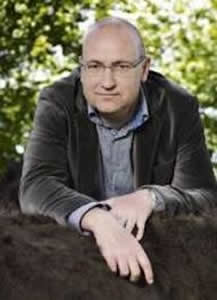
De Britse schrijver, filmcriticus en columnist Gilbert Adair werd geboren op 29 december 1944 in Edinburgh. Zie ook alle tags voor Gilbert Adair op dit blog.
Uit: The Real Tadzio
“ON A DECEMBER afternoon in 1910 Thomas Mann treated his immediate family circle, his wife and elder brother, to a reading of a short work of fiction, “The Fight Between Jappe and Do Escobar,” which he had just that day completed. Mann, who was then in his mid-thirties, had been feeling as ill-humored, as cantankerous, as irritably out of sorts, as one of his own neurotic protagonists. He had laid aside (temporarily, he assumed) a projected comic novel to which, as it transpired, he would return only at the very end of his life and which was first published, in English, with the rather unwieldy title Confessions of Felix Krull, Confidence Man: the Early Years, in 1955. He had also been troubled, although less profoundly than might have been predicted, by the horrific death of his younger sister Carla. The garish circumstances of her suicide–she had swallowed, as Mann himself was later to write, with an unnerving absence of sibling warmth, “enough potassium cyanide to kill a company of soldiers”–suggested that poor Carla had ceased to make too much of a distinction between her own life and the melodramas in which, as a hopelessly third-rate actress, she had tended to be cast.
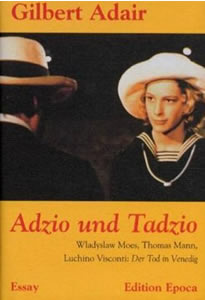
Cover van de Duitse vertaling “Adzio und Tadzio” met Björn Arnesen
Unable to channel his intellectual energies into any form of extended labor, Mann had quickly dashed off his new story after an unexpected encounter with a childhood friend, Count Vitzum von Eckstadt, revived memories of their schooldays together, memories which, as was almost invariably his custom, he sought at once to transmute into fiction.
“The Fight Between Jappe and Do Escobar” is a minor but perfectly achieved example of Mann’s storytelling genius. It centers on an abortive fist-fight between two youths, a German and a Spaniard, refereed by a somewhat equivocal dancing-master, Herr Knaak (“who picked up the edge of his frock-coat with his finger-tips, curtsied, cut capers, leaped suddenly into the air, where he twirled his toes before he came down again”), and observed by a third boy, a twelve-year-old English cherub named Johnny Bishop. This is how Mann pictures Johnny in his Sunday finery: “He was far and away the best-dressed boy in town, distinctly aristocratic and elegant in his real English sailor suit with the linen collar, sailor’s knot, laces, a silver whistle in his pocket and an anchor on the sleeves that narrowed round his wrists.”
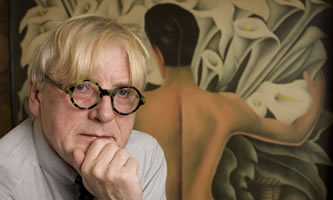
De Amerikaanse schrijver Paul M. Rudnick werd geboren op 29 december 1957 in Piscataway, een voorstad van New York. Zie ook alle tags voor Paul Rudnick op dit blog.
Uit: Life and Death and New Jersey
“Whenever I stumble over my own feet, or blurt out a thought which makes no sense at all, or leave the house wearing one pattern too many, I always think, it’s okay, I’m from New Jersey. I love New Jersey, because it’s not just an all-purpose punchline, but probably a handy legal defense, as in, “Yes, I shot my wife because I thought she was Bigfoot, but I’m from New Jersey.”
New Jersey never disappoints. The paper placemats at Jersey diners are often printed with factoids about the Garden State, but they rarely mention that, as of this writing, the last three New Jersey governors have all broken their legs while in office. Among those on this disabled list was ex-Governor McGreevey, who stepped down after coming out as a proud Gay American, having appointed his Israeli mancrush as the State Director of Homeland Security. McGreevey and his understandably peeved ex-wife then published duelling memoirs, and Jim later crowed that Dina’s book hadn’t sold well due to “her awful appearance on Oprah, in an inappropriate and ill-fitting ballgown with a plunging neckline.” Jim is now studying to become a Jesuit priest.
I was raised in the suburb of Piscataway, where the Chamber of Commerce sponsored a promotional billboard picturing two cartoon Native Americans, in feathers and striped warpaint. One of these braves was shading his eyes with his hand and scanning the horizon, with the caption, “They went Piscataway!” Piscataway is also the home to many industrial parks, where gracefully landscaped acreage surrounds the buildings which market bath towels, silicone breast implants, and napalm. There’s a nearby complex which manufactures the contraceptive Orthocreme, and the site is so large that it contains a road named Ortho Drive. There also used to be a majestic grove of evergreens along the highway, enhancing a sign that advertised feminine hygiene products, with enormous, lustrously lit scripted letters reading, “Modess . . . because.” As a child, this sign enticed and confused me. Because why?”
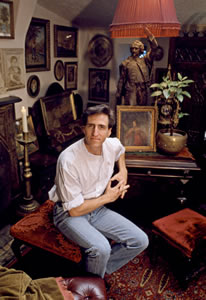
De Amerikaanse schrijver William Gaddis werd op 29 december 1922 geboren in New York. Zie ook alle tags voor William Gaddis op dit blog.
Uit: Agapē Agape
‘… the Welte-Mignon that didn’t just record the notes but more perforations that actually reproduced all the shadings and subtleties of the artist, the unique performances of their own work by Debussy and Grieg, Rachmaninoff George Gershwin and the greatest pianists, Paderewski and God knows who, don’t you see? These Welte, Duo-Art Pianolas, Ampico all over the place what they’d done was to make the transient permanent, given the fleeting nature of music of great performances of great music a permanence that’s the heart of authenticity….when Welte’s reproducing apparatus put Debussy into the piano you wouldn’t need Debussy. You wouldn’t need Grieg you wouldn’t need Gershwin or Paderewski or any of them because you’d have authenticity and the whole concept of authenticity preserved, the music itself and the fleeting performances brought together forever, given permanence that’s the heart of authenticity’
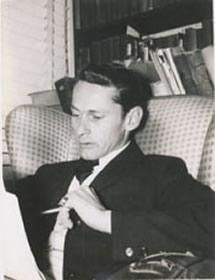
Zie voor nog meer schrijvers van de 29e december ook mijn vorige blog van vandaag.
